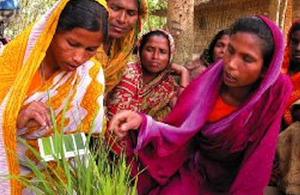DFID Research: Linking farmers and science
The PETRRA project in Bangladesh has achieved substantial improvements in rice production, income and empowerment of women.

PETRRA gave women access to knowledge that they were previously denied. Picture: Paul Van Mele
By linking scientists, non-government organisations and government extension officials and farmers, the Poverty Elimination Through Rice Research Assistance (PETRRA) project in Bangladesh has achieved substantial improvements in rice production, income and empowerment of women.
PETRRA’s objective was to facilitate the development of a research system that was more responsive to the needs of resource-poor farmers. Over five years, 45 sub-projects were commissioned with more than 47 partner agencies. The project identified or developed more than 10 significant technologies, improved methods for disseminating technologies and provided an opportunity for policymakers to engage with critical policy issues.
With higher yields and reduced expenditure on inputs, new technologies raised the incomes of resource-poor farmers significantly. Farmers’ views and knowledge helped scientists adapt new technologies to make them more relevant and appropriate for their circumstances. By treating women and men equally and including them in all of the activities, PETRRA gave women access to knowledge that they were previously denied. The value-based management approach developed under PETRRA has demonstrated that traditional institutions, both national and international, can be innovative in creating an environment for the development of technology that is readily taken up by resource-poor farmers, men and women.
Read the full version of this case study.
More information
The PETRRA project was a five year project from 1999 to 2004. DFID provided a grant of £9.5 million.
Key reference:
Magor, N.P., A. Salahuggin, M. Hague, T.K. Biswas and M. Bannerman, (eds.) (2007) PETRRA - an experiment in pro-poor agricultural research. Dhaka (Bangladesh): Poverty Elimination through Rice Research Assistance Project, International Rice Research Institute (IRRI)